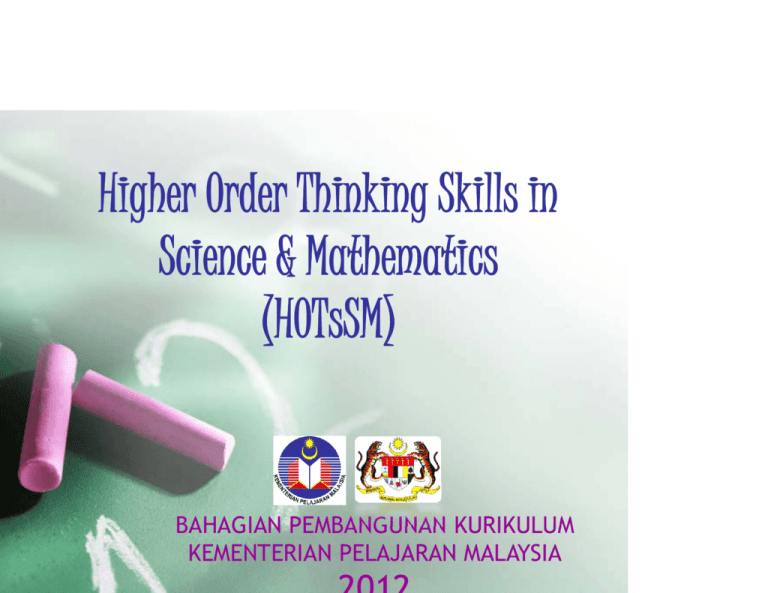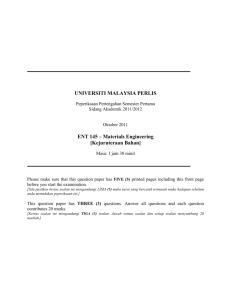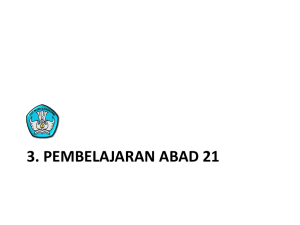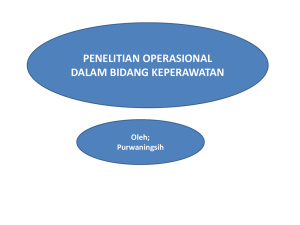HOTsSM - PBS SMK Georgetown
advertisement

Higher Order Thinking Skills in Science & Mathematics (HOTsSM HOTsSM)) BAHAGIAN PEMBANGUNAN KURIKULUM KEMENTERIAN PELAJARAN MALAYSIA akhir sesi ini anda akan dapat: Memahami apa itu HOTs dalam Matematik. Matematik Menerapkan HOTs dalam kalangan murid. Menyampaikan taklimat berkaitan HOTs kepada guru-guru guru guru lain. lain Sesi Taklimat ini mengandungi DUA komponen: 1) Penerangan & Perbincangan 2) Perbengkelan Apa itu HOTs dalam Matematik? LOWER ORDER THINKING (LOTs) Resnick (1987) Lower-order thinking (LOT) is often characterized by the recall of information or the application of concepts or knowledge to familiar situations and contexts contexts. Schmalz (1973) LOT tasks requires a student “… to recall a fact, perform a simple operation operation, or solve a familiar type of problem. problem It does not require the student to work outside the familiar” Senk, Beckman, & Thompson (1997) LOT is involved when students are solving tasks where the solution requires applying a well-known algorithm, often with no justification, explanation, or proof required, and where only a single correct answer is possible Thompson 2008 generally characterized LOT as solving tasks while working in familiar situations and contexts; or, applying algorithms already familiar to the student. HIGHER ORDER THINKING SKILLS (HOTs) snick (1987) characterized higher-order thinking (HOT) as n-algorithmic.” in and Lane (1996) describe HOT as “the use of complex, n-algorithmic thinking to solve a task in which there is not a di t bl well-rehearsed dictable, ll h d approach h or pathway th explicitly li itl suggested t d the task, task instruction, or a worked out example.” nk, et al (1997) characterized HOT as solving tasks where no nk orithm has been taught, where justification or explanation are uired, and where more than one solution may be possible. ompson (2008) generally characterized HOT involves solving ks where an algorithm has not been taught or using known orithms while working g in unfamiliar contexts or situations. HIGHER ORDER THINKING SKILLS (HOTs) Higher order thinking ills are normallyy those skills in the top four levels of the revised Bloom’s l ’ taxonomy: applying, analysing, aluating and creating. aluating, creating HIGHER ORDER THINKING SKILLS (HOTs) “Higher-order” questions promote learning because these types of questions require students to apply, analyze, synthesize, and evaluate information instead of simply recalling facts. HIGHER ORDER THINKING SKILLS (HOTs) Termasuk pemikiran kritikal, pemikiran kreatif, p pemikiran logikal, pemikiran reflektif dan meta-kognitif meta kognitif. HOTs dicetuskan melalui masalah bukan rutin, rutin masalah yang tidak jelas atau dilema. Mengapa perlu HOTs dalam Matematik?? Matematik Menghasilkan modal insan yang cerdas, kreatif dan inovatif bagi memenuhi cabaran abad ke-21 agar negara mampu bersaing di persada dunia. dunia If we want students to develop the capacity to think, reason, and problem solve then we need to start with high-level high level, cognitively complex tasks. Stein & Lane 1996 ds in International Mathematics and Science Studies TIMSS 2007 Average Achievement in the Mathematics Content and Cognitive Domains aysia performed below TIMSS average in both Mathematics • Berubah ke arah lebih daripada kefahaman asas dan rote memorization. memorization • Meningkatkan tahap kefahaman • Meningkatkan kemampuan menjustifikasikan penyelesaian dan dapatan. • Konsep matematik dapat dipelajari dengan l bih berkesan lebih b k melalui l l i HOTs. HOT • Meningkatkan keupayaan murid dalam menyiasat dan meneroka idea matematik memerlukan HOTs. HOTs DALAM KURIKULUM MATEMATIK • Pernyataan Standard Kurikulum ditulis menggunakan kata kerja mengikut Taksonomi Bloom. Bloom Kata Kerja Metaperwakilan • Bagi HP yang menggunakan kata kerja seperti menyatakan dan menerangkan turut menuntut guru menyediakan di k aktiviti k i i i yang menekankan HOTs Bagaimana meningkatkan HOTs? erlu kepada transformasi dalam PdP: uru perlu berubah cara: berfikir Mengajar - kurangkan chalk and talk, perbanyakkan hands on Menyoal (ms 4 & 5) Memotivasi Mentaksir Tingkatkan kualiti tugasan yang diberi kepada murid PELAKSANAAN HOTs MENUNTUT Sikap Positif ngaging Pelbagai Pendekatan Non-algorithmic Pemikiran Reflektif untukan Masa Membuat & menguji konjektur Pelbagai Perkaitan Kritikal & Analitikal Komunikasi Penaakulan & Pembuktian Pelbagai Strategi Penerokaan & P Penyiasatan i t Kefahaman Mendalam Kreatif & Inovatif PELAKSANAAN HOTs MENUNTUT uru perlu merancang oalan, tugasan dan tiviti yyang g menuntut urid berfikir, berlatih berfikir secara rterusan dan menilai mikiran mereka dan mikiran individu lain. lain Worthwhile and Rich t k task Different levels of response by Robert Sternberg (A (American i C Cognitive ii P Psychologist) h l i ) Teacher should answer children's questions in a wayy that p q promotes HOTs. Level 1: Reject the question Example: p "Why do I have to eat my vegetables?" "Don't ask me any more questions.“ "Because I said so." Level 2: Restate or almost restate th question the ti as a response Example: p "Why do I have to eat my vegetables?" "Because you have to eat your vegetables." "Why is that man acting so crazy?" "Because Because he's he s insane. insane " Why is it so cold? cold?" "Why "Because it's 15° outside." Level 3: Admit ignorance or present information Example: "I don't know, but that's a good question." or, Give a factual answer to the question. Level 4: Voice encouragement to seek response through authority Example: l “Let's look that up on the internet.” “Let's look that up in the encyclopedia ” encyclopedia. “Who Who do we know that might know the answer to that?” Level 5: Encourage brainstorming, or consideration of alternative explanations Example: l "Why are all the people in Holland so tall? tall?“ "Let's Let s brainstorm some possible answers." "Maybe y it's g genetics,, or maybe y it's diet,, or maybe everybody in Holland wears elevator shoes, or…" etc. Level 6: Encourage consideration of alternative explanations and a means of evaluating them Example: "Now how are we going to evaluate the possible answer of g p genetics? Where would we find that information? Information on diet? The number of elevator shoes sold in Holland?” Level 7: Encourage consideration of alternative explanations plus a means of evaluating them, and follow-through on evaluations Example: "Okay, let's go find the information for a few days — we'll search through the encyclopedia and the Internet, make telephone calls, conduct interviews, and other th things. thi Th Then we will ill gett b back k together next week and evaluate our findings " findings. Bring B i a closure l to t Sternberg, g, so what? • Teacher should answer children's questions in a way that promotes HOT, so which level shall the teachers pitched on? NINGKATKAN PEMIKIRAN MATEMATIK MURID S 310-311) 310 311) Soalan Bukan Rutin yang memerlukan tahap kognitif yang tinggi dapat membentuk HOTs dalam kalangan murid. RUTIN “Problems can be solved using methods familiar to students by replicating eviously learned methods n a step‐by‐step fashion.” n a step by step fashion. Routine problem solving stresses the use of sets of known or f t fk prescribed procedures (algorithms) to solve problems” BUKAN RUTIN q “Problems that require mathematical analysis and reasoning; many non routine problems many non‐routine problems can be solved in more than one way, and may have more than one solution.” RUTIN BUKAN RUTIN • Perlunya keseimbangan antara soalan rutin dengan bukan rutin. • Penekanan kepada soalan bukan rutin penting bagi: Membentuk modal insan yang berfikrah. Merealisasikan hasrat negara untuk mencapai satu pertiga teratas dalam TIMSS dan PISA. Contoh Soalan TIMSS & PISA CONTOH SOALAN TIMSS Place either + or - into each box so th t this that thi expression i h has th the llargestt possible total? 5 6 3 9 CONTOH SOALAN TIMSS Which circle has approximately the same fraction of its area shaded as the rectangle above? A D B C E CONTOH SOALAN TIMSS What is the perimeter of a rectangle whose area is 100 square meters? Answer: CONTOH SOALAN LAIN Antara nombor-nombor nombor nombor berikut, nombor yang mana berbeza? Mengapa? 23, 20, 15, 25 CONTOH SOALAN TIMSS Brad wanted to find three consecutive whole numbers that add up to 81. He wrote the equation equa o (n −1)+ ) n + (n +1)) = 81. 8 What a does the n stand for? A) The least of the three whole numbers B) The middle whole number C) The greatest of the three whole numbers. D)) The difference between the least and the greatest of the three whole numbers. TIMSS Population 2 Item Pool (Released Items). Copyright © 1994 by IEA, The Hague CONTOH SOALAN TIMSS A car salesman placed this advertisement in the newspaper: “Old and new cars for sale, different prices, average price RM 50,000.” From the advertisement, advertisement which of the following must be true? A) Most of the cars would cost between 68 RM40,000 and RM60,000. B) Half of the cars would cost less than 35 RM50 000 and half would cost more than RM50,000, RM50,000. C) At least one of the cars would cost RM50,000. D) Some of the cars would cost less than RM 50,000. 28 Daripada 153 orang pelajar hanya 18% 22 CONTOH SOALAN TIMSS John and Cathy were told to divide a number by 100. By mistake John multiplied the number by 100 and d obtained bt i d an answer off 450 450. Cathy correctly divided the number by 100. What was her answer? A. 0.0045 B. 0.045 C 0.45 C. 0 45 D. 4.5 TIMSS 2003 8th-Grade Mathematics Concepts and Mathematics Items CONTOH SOALAN PISA 1) (a) Which of the figures has the largest area? Show your reasoning. (b) Describe a method for estimating the area of figure C. 2) Nick wants to pave the rectangular patio of his new house. The patio has length 5.25 2 metres and width 3 3.00 00 metres. He needs 81 bricks per square metre. Calculate how many bricks Nick needs for the whole patio. patio CONTOH SOALAN LAIN Mary claims that you can find the area of any 30 30-60-90 60 90 triangle given the length of only one side. Is Mary correct or not? Justify your answer. CONTOH SOALAN LAIN Panjang sisi sebuah segiempat sama B adalah empat kali ganda segiempat sama A. Berapa kalilah lebih besar luas B berbanding luas A? Segiempat sama A Segiempat sama B CONTOH AKTIVITI ken Pottery herd” is part of a piece of pottery that one might dig up at an aeological site where pottery‐making people once lived. aeologists usually want to figure out how big the original piece of ery was, as that can tell them something about who might have e the piece and when it was made. g the sherd shown on the right, devise a hod for determining the diameter of the nal plate. a: Can you come up with another method? a: Can you come up with another method? ONTOH AKTIVITI Nombor Perdana Bagaimana cikgu mengajar Nombor Perdana? Nombor Perdana ONTOH AKTIVITI FAKTOR BIL. FAKTO R KUMP NO. 14 15 16 17 18 19 20 21 22 23 24 25 FAKTOR BIL. FAKTO R KUMP Nombor Perdana ONTOH AKTIVITI FAKTOR BIL. FAKTO R KUMP NO. FAKTOR BIL. FAKTO R 1 1 A 14 1,2,7,14 4 1,2 2 B 15 1,3,5,15 4 1,3 2 B 16 1,2,4,8,16 5 1,2,4 3 17 1,17 2 1,5 2 18 1,2,3,6,9,18 6 1236 1,2,3,6 4 19 1 19 1,19 2 1,7 2 20 1, 2, 4,5,10,20 6 1,2,4,8 4 21 1,3,7,21 4 1,3,9 3 22 1,2,11,22 4 1,2,5,10 4 23 1,23 2 1 11 1,11 2 24 7 1,2,3,4,6,12 6 1,2,3,6,8,12, 1 2 3 6 8 12 24 B B B KUMP B B B ONTOH AKTIVITI How many one‐by‐one tiles are required to surround a 5x5 p pool? Develop a generalization that predicts the number of tiles required to surround a square pool of any size required to surround a square pool of any size. Explain how your generalization relates to the size of the pool and the number of border tiles. ONTOH AKTIVITI M k k Masalah Menukarkan M l h Rutin R t kepada k d Masalah Bukan Rutin OTS HOTS MASALAH RUTIN KEPADA BUKAN RUTIN TUGASAN 1 Maria membeli sekotak susu dengan g harga g RM1.55 dan sebungkus biskut dengan harga RM1.70. Berapakah jumlah wang yang dibayar oleh Maria? TUGASAN 2 Maria membeli sekotak susu dengan harga RM1.55 dan sebungkus biskut dengan harga RM1 70 Dia RM1.70. Di memberikan b ik RM4.00 RM4 00 kepada k d jurujual. Berapakah bilangan syiling yang diterima oleh Maria sekiranya jurujual itu memberikannya b ik b b beberapa syiling ili 5 sen, 10 sen MASALAH RUTIN KEPADA BUKAN RUTIN TUGASAN 2 HOTS TUGASAN 1 Cari perimeter segi empat tepat yang mempunyai panjang p j g 8 meter dan lebar 17 meter. Cari panjang sebuah segi empat tepat yang mempunyai luas 48 meter persegi dan lebar 6 meter. Mamat ingin membina pagar bagi reban ayam yang berbentuk segi empat. Dia mempunyai 20 meter wayar pagar. 1. Apakah saiz segiempat yang boleh beliau hasilkan? 2. Bentuk manakah yang terbaik? LOTS MASALAH RUTIN KEPADA BUKAN RUTIN SOALAN RUTIN: Satu sisiempat mempunyai sudut-sudut 100, 60, and 130. Apakah nilai sudut yang keempat? • Boleh Dikembangkan Kepada: Bolehkah sisiempat mengandungi empat sudut cakah? Bagaimana anda tahu? Bolehkah segitiga mengandungi lebih daripada satu t sudut d t cakah? k h? Terangkan. T k Bolehkah sisiempat mengandungi dua sudut y boleh, lukiskan rajah. j cakah? Sekiranya Sekiranya tidak, terangkan. Bolehkah sisiempat mengandungi tiga sudut cakah? Sekiranya boleh, boleh lukiskan rajah. rajah Sekiranya tidak, terangkan. MASALAH RUTIN KEPADA BUKAN RUTIN Bundarkan 726 kepada ratus yang terdekat? HOTS LOTS Apakah A k h nombor b yang boleh b l h dibundarkan kepada 700? MASALAH RUTIN VS. BUKAN RUTIN SOALAN RUTIN Tidak memerlukan murid untuk menggunakan kemahiran berfikir pada aras tinggi. Operasi yang perlu digunakan adalah elas. SOALAN BUKAN RUTIN • Memerlukan tahap pemikiran pada aras tinggi. • Meningkatkan kemahiran menaakul. • Jawapan dan prosedur yang perlu digunakan tidak serta merta jelas. • Menggalakkan gg lebih daripada p satu cara penyelesaian dan strategi. • Terdapat lebih daripada satu jawapan. • Lebih mencabar. mencabar • Berupaya membentuk murid yang kreatif dan inovatif • Penyelesaian memerlukan lebih daripada membuat keputusan dan memilih operasi matematik. g sesuai untuk • Memerlukan masa yyang diselesaikan. Skema Pemarkahan TIMSS & PISA SKEMA PEMARKAHAN TIMSS SKEMA PEMARKAHAN PISA SKEMA PEMARKAHAN PISA Tidak semua tugasan g sama,, tugasan g yyang g berbeza menggalakkan tahap dan jenis pemikiran yang berbeza. Tahap pemikiran di mana murid id melibatkan diri akan menentukan tahap pembelajaran mereka. ERBINCANGAN DALAM UMPULAN KECIL: engembangkan Soalan Rutin(LOTs) epada Bukan Rutin(HOTs) 1. Bentukkan kumpulan 2 orang. 2. Tukarkan soalan rutin yang diberi kepada soalan bukan rutin. Kembangkan soalan berikut agar menjadi soalan bukan rutin. rutin 1) 825 5 = 2) Cari perimeter bagi rajah dibawah. 8 cm 3 cm 3) Cari min, median dan mod bagi data berikut: 15, 16, 18, 37, 39 4) Cari isi padu kotak yang mempunyai dimensi 4 cm x 2 cm x 8 cm. cm CONTOH JAWAPAN 1) Marcella had 825 cupcakes and sold all but 5. If she sold them in packages, what might be the size and number of the packages? How do you know? 2) Is it possible for two rectangles to have an area of 24 sq cm but b th have diff differentt perimeters? i t ?E Explain l i h how you k know. 3) Find five data values so that the mean is 25 and the median is 18. Explain your answers. 4)) Can two different boxes have the same area for the base but different volumes? Can two different boxes have different dimensions for the base but the same volume? Explain. Tindakan Susulan Guru • • • • • Adakan taklimat dalaman di sekolah masingg masing kepada semua guru Sains dan Matematik. Gunakan kandungan dan tempoh masa taklimat seperti ti yang diterima. dit i Semua guru Sains dan Matematik menggunakan soalan HOTs soala O s dala dalam pdp. Guru Sains dan Matematik Tingkatan 1 mula menyediakan murid untuk Gerak Gempur HOTsSM pada d Jun J dan d Okt 2013 & 2014 untuk t k persediaan di murid ke TIMSS 2014 dan PISA 2015. Soalan dan skema Gerak Gempur akan disediakan secara berpusat dan pelaporan perlu disediakan. TERIMA KASIH


